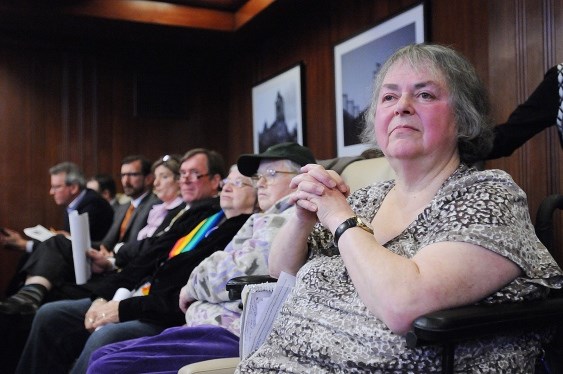The public hearings at city hall these past few weeks over the redevelopment proposal for the 25-acre Pearson-Dogwood site have been extraordinary for a number of reasons.
As you may know from the Courier’s coverage by my colleague Naoibh O’Connor, the property on West 59th between Heather and Cambie now houses two health care facilities: The George Pearson Centre for adults with severe disabilities and the Dogwood Lodge for seniors who need complex care requiring 24-hour nursing care. Vancouver Coastal Health owns 20 acres and the province owns the remaining five.
For councillors used to dealing with development proposals by looking at issues like density, building heights, parking, traffic patterns and noise or light pollution, this particular proposal put them well outside their comfort zone.
Here, as the public discussion first opened up in council chambers last month, they were faced with a wall of folks more intent on talking about the United Nations Convention on Rights of Persons with Disabilities.
The point was repeatedly made that the plan being brought forward by Vancouver Coastal Health did not meet the criteria outlined by that convention which was signed off on by Canada back in 2008 and included specific references to the rights to appropriate accommodations for people with disabilities.
As councillor Geoff Meggs told me later, it was not clear whether the city had the expertise or the jurisdiction given the nature of the development and the owners of the land.
There was plenty of expertise in the room though, led off by Jill Weiss, the chair of the city’s Persons with Disabilities Advocacy Group. Weiss’s committee had collaborated with two other major stakeholders, Pearson Residents Development Group and the B.C. Coalition of People with Disabilities, to draw up a proposal for Pearson’s redevelopment.
Rather than a discussion about bricks and mortar, it was focused on human rights and the services and living conditions required to satisfy those rights. In fact the advocates for the disabled were seeking four clearly different living situations dependent of the different needs and desires of their cohort.
What they were seeking was a continuation of a process that has been taking place in this part of the world for several decades now which is a setting described as community living, they describe as “housing and support options, all with people having control and autonomy over their lives.”
That ranges from independent fully accessible apartments with varying degrees of support, to small group settings of fully accessible apartments and a housing form called a “Greenhouse” which accommodates six to 12 people with their own bathrooms and bedrooms, common living and kitchen facilities with full time staff.
What they did not want was another “institution” as defined by the European Coalition for Community Living this way: “An institution is any place in which people who have been labeled as having a disability are isolated, segregated and/or compelled to live together. An institution is also any place in which people do not have, or are not allowed to live together. An institution is also any place in which people do not have, or are not allowed to exercise control over their lives and their day-to-day decisions. An institution is not defined merely by its size.”
After several hours of compelling testimony, council agreed to toss the package back to the Health Authority and the city’s own staff to find a more suitable solution. City manager Penny Ballem, who just happens to be a doctor and former deputy minister of health with the province called for a “front court press” on the matter: “We want to go talk to the people who are actually creating the policy the Health Authority is working under.”
Rather than smoldering in a fog of delay as we have seen especially with a number of the city’s controversial community plans, this had a fire lit under it.
Within a week, advocates were in the back rooms with the Health Authority amending the proposal. Within two weeks, on Feb. 5, a far more acceptable plan was back before council. We have yet to see the zoning application, but the effectiveness of citizen intervention and the brief time it took to happen is just one more reason to consider this extraordinary.
agarr@vancourier.com
twitter@allengarr



